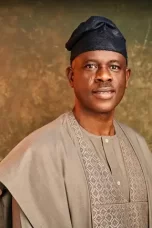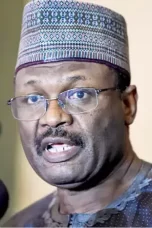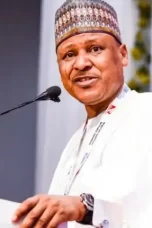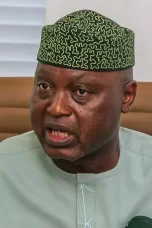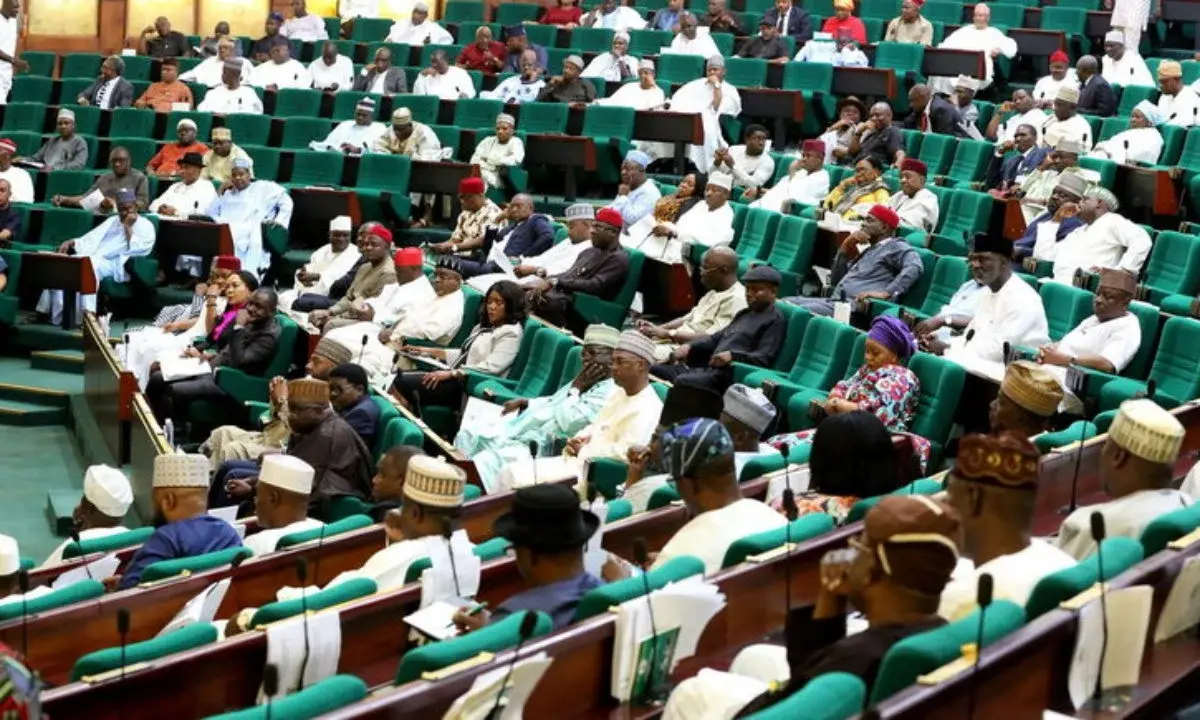
LAWYERS and political activists have shot down the plan by 60 Members of the House of Representatives to change the nation’s Presidential system of governance to a Parliamentary system, saying Nigeria requires a new constitution and restructuring of the country.
They said nothing significant would come out of the adventure by the lawmakers, who seem to be playing a game. However, few Nigerians who backed the proposal, said it would reduce the cost of governance.
No to cut-and-nail amendments – Wills, Bayelsa
A legal practitioner and co-convener of Embassara Foundation, an Ijaw think-tank for good governance, Iniruo Wills, told Saturday Vanguard at Yenagoa, Bayelsa State that, “What we need now is a holistic approach to remaking a constitution, not piecemeal cut-and-nail amendments about the parliamentary or presidential system.
Nigeria runs on a plastic constitution that lacks legitimacy but gains legalism only from the acquiescence of the people, the same way military regimes do in law. We need a new and organic constitution flowing from the active will and consent of the people. If the President or National Assembly does not start that process this year, starting it any other time in the current term will be as wasteful as the former Presidents Olusegun Obasanjo and Goodluck Jonathan political conferences.
In the national negotiations for a whole new constitution, we can properly examine the pros and cons of the two conventional systems, and tailor either of them to draw from our lived experience and assure ourselves a workable nation. The 60 parliamentarians should invest their energy in that direction.”
Misleading proposal – Omare, ex-IYC leader
Former president of Ijaw Youth Council, IYC and lawyer, Eric Omare, said: “In the first place, the current bicameral legislature is unnecessary and amounts to a waste of national resources. Hence, on paper, the agitation by the 60 members of the House of Representatives is laudable. In practice, the initiative would not come to fruition because selfish people rule Nigeria.
I say so because, under our current constitutional system, it would require the support of both chambers of the National Assembly to amend the constitution to revert to the parliamentary system. The Senate may most likely not give way to achieving a parliamentary system, it would never support the idea.
Also, I do not see the executive with the political will to push it through. Hence, I strongly feel that nothing worthwhile would come out of the laudable idea to reduce the cost of governance.”
Not advisable – Fyneface, Rivers activist
A political analyst and executive director of Youths and Environmental Advocacy Centre (YEAC-Nigeria), Rivers State, Fyneface Dumnamene Fyneface, argued that the parliamentary system would no longer be appropriate for a diverse nation like Nigeria, irrespective of its advantages over the presidential system. He said lawmakers would become more aggressive and play the game of do-or-die politics to win seats since the parliament will once again be the source of power and make the choice of the prime minister.
This would allow them to remain in the house if a change in the prime minister’s selection occurs, and the crisis would result in more shady politics for the proposed cabinet system, should it be implemented. What our ancestors witnessed which led to the parliamentary system being abandoned in favor of the presidential system, both the sponsor of the bill and 60 lawmakers supporting it will never be able to perceive it. Citizens should demand reduction in the cost of governance at all levels, good governance from their lawmakers, and hold politicians accountable to the people”.
ALSO READ: Hardship: We’re dealing with poverty in Nigeria, not food scarcity — Obanikoro
It’ll make no difference – Akpan, Akwa Ibom activist
Executive Director, COMPPART Foundation for Justice and Peace Building, Akwa Ibom State, Saviour Akpan, stated; “It is not about which system you operate. The truth is that our leaders, the Presidency, and all arms of the government are bereft of ideas on how to solve Nigeria’s problem. That is why they are making a big deal of some of these mundane issues. We had a parliamentary system before, why did we move away from it? Now you are clamoring to return to the same parliamentary system which you said was not good.
The pertinent question is, even if we go back to the parliamentary, will it make our politicians to respect the law? What makes democracy work is not whether it is parliamentary or federalism. What makes democracy work is respect for the rule of law fundamental freedom and human rights. Our elections are not free and fair. In parliamentary, we are still going to conduct elections that are not free and fair. So long as these irregularities prevail, switching to the parliamentary that we discarded decades ago will not make any difference. Maybe those who think it is a big deal to move back to parliamentary should test run it first in their villages.”
Lawmakers playing script – Gbemre
Coordinator, Niger Delta Peace Coalition, NDPC, Zik Gbemre, however, said, “If passed, signed into law and implemented, the bill to transform from Presidential to Parliamentary government will drastically reduce the cost of governance. Governance at the national and state levels must be made less attractive. Nigeria does not need expensive governance as it is today. The political structure needs to be overhauled to what it was before the January 1966 coup d’état.
The cost of running governance is costly for Nigeria. We need to adopt the parliamentary system of governance of the United Kingdom. Money spent on the cost of governance is wasteful and unnecessary in my opinion. Emphasis must also be placed on security in the amendment of the constitution.
Nigeria is facing insecurity challenges with the invasion of armed men called bandits from neighbouring countries. The entire political structure must be restructured and made viable to attract economic development. Nigeria is drifting backward at an alarming rate. No sector is functioning today.
The security and all related sectors have collapsed. “But who would trust the gluttons in the National Assembly enjoying the stupendous entitlements from the bloated allocations budgeted to them yearly to honestly pass a law to reduce their windfalls? At best, they are just telling Nigerians what they want to hear with no commitment to let it materialize. These lawmakers, insensitive to the increasing suffering Nigerians are facing from their misrule know that public anger is mounting and something can give. So, I presume they are just playing this script with the bill to divert public attention as if they mean well.”
A political activist, Mr. Blessing Adima, told Saturday Vanguard in Delta State: “The argument for the parliamentary is an insincere conversation; we are not ready to tackle the situation that we have at hand. If the presidential system has been thriving in other climes, how come it does not in Nigeria?
Is there any system of government that we will not quarrel about? What we need is true federalism; what we are agitating for is restructuring. I do not see how the parliamentary system of government will translate to reducing the cost of governance in Nigeria because our leaders have been insincere over time. The difference between the parliamentary and today’s presidential system is that not many people are aware of what the government wants to do; there is too much power with this group of leaders that we have. Make one of them the leader of a parliamentary system, it will still be a corrupt system. What we are talking about is total restructuring; let enough power be devolved to other units and let the people at the grassroots, the local people have input in government”.
Putting the cart before the horse – Ogwuche
From Rivers State, constitutional lawyer, Chief Festus Ogwuche, asserted: “Incidentally, we have practiced both the parliamentary and presidential system, and enough experience has been garnered that will give us a glimpse of what the picture of the two looks like. But it is obvious that the presidential system does nothing but only creates political strongholds from where monsters emerge. In other words, the presidential system is over-generous in its power allocation mechanism in a manner that constitutes a serious threat to society.
A good system could be bad and vice versa depending on the persons operating it. I do not think that we would have got a better bargain differently to what we have now if the current system is parliamentary, as different from a presidential system, so long as the same characters run it.
The initiative by the legislators indicates a desire for a transformation, and detour from the precipice of doom staring us all in the face. But then, much as commendable as the move appears, it must be acknowledged that no matter how impressive a system is, it will falter when placed on the national structure with all its defects and incongruities. We shall have nothing new or enervating in any system that applies, so long as we continue to insist on the current national framework and structure, which are identified as the ultimate clog in the wheel of our advancement. To talk about supplanting the system or transitioning it into a new brand without tackling the problem of the defects in the component structure is akin to placing the cart before the horse”.
Edward Omaga, human rights lawyer and President of Global Integrity Crusade Network (GICN), a pro-democracy, anti-corruption and justice sector Civil Society Organization, CSO, said; “Nigeria was better of under the parliamentary system of government where we had the head of state and head of government. We had a better economy and almost all African countries were dependent on Nigeria for help. We had a better system until a constitutional conference that gave us the presidential system of government that we have today.
You will always hear of the good old days because we had a better system. Of course the parliamentary system is more advantageous over the presidential system in terms of cost given the number of senators, the number of House of Representatives members, down to the state and local government level. The system also leaves too much powers in the hands of the president under the constitution. It’s either we overhaul it or we throw it away completely and have a new one. Hence the agitation should be a constitutional review.
Robert Hom, a lawyer and Public Affairs commentator said, “Everyone knows that this presidential system of government is not working for us as a country, maybe because it lacks the local content that it deserves to suit our peculiarities and special circumstances. Nigeria is not America where we imported the system of government from. We have applied it hook, line and sinker and the peculiarities of our system here show it has not worked for us. Now if we do a comparative analysis, the parliamentary system of government that we experimented with after independence lasted for less than four years.
How did we fare compared to a presidential system of government that we started in 1979 and had it terminated and again started in 1999 till date? How far have we fared, is it better for us? The answer cannot be far-fetched because it has not. Another perspective is the angle of the actors in the system who are misapplying the principles and by so doing making a mockery of the entire system. So, the problem also might not be the system but the actors themselves.
Switching from presidential to parliamentary won’t solve any problem—Prof Nwolise
A renowned political scientist, public affairs analyst and university don, Prof Osisioma Basil Chinedu Nwolise has described as a waste of time the ongoing debate on the desirability of switching the nation’s mode of governance from a presidential to a parliamentary system of government to save the country from irrecoverable collapse. Prof Nwolise said what the country needs now is not the parliamentary system of government but an urgent convocation of a National Brainbox to reset Nigeria on the path of survival, peace, security, development and greatness.
His words: “Our politicians are greedy, insensitive, selfish, unjust, lawless and wicked. No system will work, whether Parliamentary or Presidential until Nigeria evolves statesmen who follow the rules. Until that happens, I am tired of talking and writing in a system of deaf politicians who don’t know what leadership and governance are about. For almost 40 years, I wrote and screamed but they never listened. Nigeria right now is on the way to historical oblivion and unless statesmen surface quickly, Africa is doomed in the arena of international political economy. So, the task now is not debating parliamentary or presidential system, it is to save Nigeria’s soul first. The President should forget party and politics and assemble statesmen and a National Brainbox and a Strategic Cabinet to help him re-set Nigeria on the path of survival, peace, security, development and greatness. “If he fails, it may soon be “ nunc dimittis”.
Parliamentary system will enable us survive our challenges —Adesoji Peters
A senior lawyer, Mr Adesoji Peters is however, of the view that switching from presidential system of government to the parliamentary system of government appears to be the way to go if Nigeria must survive its legion of challenges. According to him, “At independence, Nigeria had a parliamentary system of government. This was also the practice before independence and at the regional level. There was a fusion of the executive and the legislature whereby members of the executive were also members of the legislature. During this period, Nigeria made a lot of progress and the quality of the political leadership was far better. Members of the executive and the legislature were genuine representatives of their people and they could better articulate issues affecting their constituencies at the government level. “The presidential system of government was introduced into the country by the military in 1979 as a result of the reports of the Constitutional Drafting Committee and the Constituent Assembly.
Among others, it was argued that the president should be someone who has political strength in a wider part of the country as shown in his election so that no part of the country can elect a president on its own as it happened during the first republic when the prime minister was elected by the votes from a section of the country. It was also thought that the President having the country as his constituent would be able to unite the nation.
The experience so far has been a mixed bag. “The presidential system we adopted has not been able to achieve its purpose. There has been abuse of the executive power at both the Federal and the state levels. Nigeria is more divided than before. Many who can not win elections in their constituencies have found their way into government. The presidential system has not achieved anything for the country.
We should jettison this so-called presidential system and go back to the parliamentary system. We should have a unicameral legislature. The present arrangement is unwieldy, bogus, and too expensive”.
Former Ondo State chairman of the Social Democratic Party, Stephen Adewale, said; “We continue to misplace our priority in Nigeria. Let’s not forget that we have already reached this point in the past. We used this method from 1960 to 1966, and it had serious flaws as well. By December 1965, politicians had so thoroughly perverted the system that, on January 15, 1966, when the military overthrew them, not a single citizen spoke out in their favour. Therefore, it’s not really about the kind of system we practice, but it’s about the mindset of our political leaders at all levels.
Why don’t they propose a part-time legislative system to help offset the enormous amount of money the nation spends every day on supporting the extravagant lifestyle and daily excesses of these lawmakers, rather than discussing the need to change to a system that would make these lawmakers even more powerful than they already are? I don’t believe that their stance is motivated by altruism. No matter what kind of government we choose, our politicians will always find a way to take advantage of the system and push the nation backwards as long as they have the same exorbitant and extortionate mentality.
Olugbenga Oke- Samuel, Dean Faculty of Law, Adekunle Ajasin University Akungba Akoko, Ondo state
“The ease of change of leadership in the parliamentary system is one of the attractions. It’s equally important to note that the cost of governance is relatively low in the parliamentary system because we will have fewer political officeholders. Anything that can be done to reduce the high cost of governance in Nigeria should be encouraged. I’m one of those who have been canvassing for the fusion of the National Assembly, it’s an unnecessary waste of money. We need to cut down on the cost of governance. The present arrangement is not working for the people.
Any change of structure of government should be well thought out —Prof Akhaine
A Professor of Political Science, Lagos State University, LASU, Odion Akhaine, urged Nigerians to think well about changing from the presidential system of government to the parliamentary system, even though the latter may have some advantages over the former. He said, “Any change of structure of government should be well thought out. The advantage of the parliamentary form we had in the past is that it is less expensive than presidential. It precludes winner-takes-all syndrome, and allows an official vent through which the prime minister is questioned by his loyalists and even opposition members. In some cases, a coalition of parties is required to form a government.” On whether Nigeria should do away with bicameral legislature to save cost, he said, “we can also do away with a bicameral legislature to save money. Senegal did and it is doable in our clime.”
According to a former Ambassador to the Philippines, Yemi Farounbi; ”For me, I don’t think Nigeria’s problem is either Presidential system of government or Parliamentary system, our problem is with the structure. The Federal Government has too many responsibilities to the detriment of both the State and Local Government, which ordinarily should be doing most of the duty. In developed countries, a single police don’t oversee the security of a federation, there ought to be security operatives at the other levels. Also, if the federal government takes 53.9% of the revenue whether in a presidential or parliamentary, there would be too much money at the centre when some duties, like the issues of agriculture, ought to be done best, at the local level. We have insecurity issues because our policing system is unitary.
We ought to have security at local and state government levels too. It also means the resources for funding them must be available at that level too. It is not a question of parliamentary or presidential but a structural problem, the federal government is overburdened. There is a limit to what human being can supervise. No matter who the President, he is going to face this structural problem, so, we need to look at the structure and redistribute the wealth and responsibility in such a way that it will be placed at the level nearest to the people and the money for it will also be associated with it.
Another issue is that the parliamentary will be weakened in Nigeria, we see the one they change speaker anyhow at the legislative arm, that is how they will be changing a governor or president as the case maybe. Our political system lack discipline, which is a problem too.
It is indiscipline when a governor has 250 aides, doing what? Just creating a job for the boys. It is also indiscipline to give money to lawmakers when they are on vacation. So, whether it is Presidential or Parliamentary indiscipline in the polity is a big problem too. Paying senators such huge money and giving lawmakers N120 million worth of vehicles is not because of the presidential system but indiscipline. We need a restructuring of our system and a dose of discipline to reflect that democracy is about the people and their welfare.
Abagun Kole Omololu, the National Publicity Secretary of the Pan Yoruba Socio-Political Group, Afenifere, said, “Afenifere is the number one advocate of the Parliamentary System. We have never hidden that fact. It suits our pocket. It will cut down corruption in our electoral system. Money politics will be a thing of the past. Prospective Parliamentary candidate will concentrate on his constituency. Party supremacy will be the order of the day. Moneybags with empty heads will be shut out. Intellectual acumen will be on display. The best brains will represent us.
ILoT backs parliamentary system – Mene, scribe
Secretary of the Itsekiri Leaders of Thought, ILoT, Warri, Delta State, Sunny Mene, who supports the parliamentary system, said, “The ILoT made it clear at the last confab that we should return to the parliamentary system, that the cost of governance is too costly; people should be the focus of governance. I am still in support of this position.
The presidential system is an over-bloated type of government. It is only a parliamentary system that can help us. All the tiers of government will practice a parliamentary system. The ministers will come from the cabinet. The parliamentary system will promote transparency in governance.”


